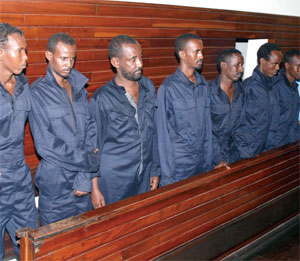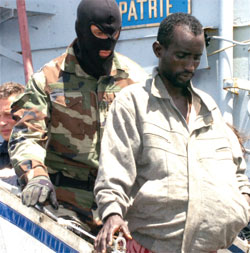
By Linah Benyawa
Wednesday, March 04, 2010
He is facing charges related to piracy in the Indian Ocean coastline in Somalia, but Ahmed Mohamed Omar vows he is not a pirate.
Omar recently shocked a Mombasa court when he told the magistrate that together with seven other suspects charged with him, they were not pirates but human traffickers.
"We are fishermen but we had left the business for a while and were doing human trafficking," Omar told the court. He said that that they were returning to Somalia from Yemen when they were arrested.
 |
|
Ahmed Mohamed Omar, third left, when he was charged with attempting to hijack MV Powerful in the Indian Ocean. |
They were arrested on November 11, 2008 on the high seas near the Somali coast by British naval forces.
They were charged with attempting to hijack MV Powerful on that day and while armed with dangerous weapons, put into fear the lives of the crewmembers.
"We are not pirates and we never attempted to attack any vessel at the high seas and I wondered why we were arrested and detained for two days and then taken to Kenya where we were charged," said Omar.
During the defence hearing, the suspects had told the court that they were carrying weapons.
"We had guns and Rocket Propelled Grenades for self defence. We carried the weapons to protect ourselves from pirates," said Omar. Omar surprised the court when he said that Somalia was a dangerous country and everyone carries guns everywhere, even in the toilet.
"If you don’t have a gun, you cannot even work," he told the magistrate when asked why he was carrying a weapon.
Human trafficking and smuggling may be an illegal business, but to them, it is just another way to make ends meet.
Later in an interview at Shimo la Tewa Prison where he is remanded, he said that ‘passengers’ always request to be transported to destinations of their choice along the Indian Ocean and the Gulf region.
"We normally conduct this business when people come to us and request to be ferried to different countries in search of greener pastures," said Omar.
High returns
He said together with his colleagues, they first ventured into the ocean to fish but soon realised that smuggling people was more profitable than fishing.
"At times we smuggle people from Bosaso town in Somalia to Yemen. Others including Kenyans demand to be ferried to Arab countries to look for better jobs," he noted.
He said that Somali nationals are always on the run to other countries, Kenya being one of the main destinations where they live as refugees. He said the vessels they use for smuggling can carry many passengers, which means high returns since they charge up to $120 (Sh9,000) per person.
"At the time when business is booming, we can carry up to 120 passengers per trip. That’s a good deal," Omar said.
He noted that despite the high charges, Somalis are always ready to part with anything as long as they are taken out of the country for the sake of their safety.
But the business is not practised on broad daylight because many countries are vigilant, he revealed.
The US and French navy have been patrolling the East African coast and the horn of Africa in an efforts to curb piracy thereby threatening their business.
Omar said they usually smuggle people late at night to evade detection.
"We are aware that the business is illegal even in Yemen. That is why we operate late at night," he says.
Due to high insecurity in the ocean, Omar said they invest heavily in good weapons.
"Though we conduct the business at night, we are usually armed. The waters we pass through are hostile and we also need to protect ourselves even from our passengers. Some of them are dangerous," he added.
 |
| A hooded German commando escorts a suspected pirate arrested in the Indian Ocean. Photos: Maarufu Mohamed/ Standard |
Speaking from Shimo la Tewa Prison, he said they were mistaken as suspected pirates because they were heavily armed.
"We carry fishing gears like grappling hooks and fishing nets while smuggling people as a disguise that we are fishermen. But the weapons made us to be mistaken for pirates," he lamented. "Somalia is a dangerous country and that is why we are always armed."
He said they don’t force people into the trade adding that they find it very normal to ferry people to different parts of the world to look for greener pastures.
The United Nations Office on Drugs and Crime (UNODC) describes smuggling of Migrants as a crime involving the procurement for financial or other material benefit of illegal entry of a person into a state of which that person is not a national or resident.
Breeding ground
Human trafficking on the other hand is defined as the practice of humans being tricked, lured, coerced or otherwise removed from their home or country and then forced to work with no or low payment or on terms which are highly exploitative.
But Omar said they have at no time lured, tricked or forced people into being taken out of the country. He said their clients are the ones who persuade them to ferry them to the destination of their choice.
"In Somalia, everyone wants to survive, we have to do the illegal trade even without caring whether its illegal," he said.
Omar said he had been fishing for four years and was aware that the Gulf of Aden is dangerous and that pirates existed. Currently there are more than 130 suspected pirates remanded at the Shimo la Tewa Prison. Ten have already been convicted and sentenced to seven years imprisonment.
But Somalia is not only know for pirates but has also developed a reputation as a breeding ground for terrorists linked to the Al Qaeda terror group.
Source: Standard